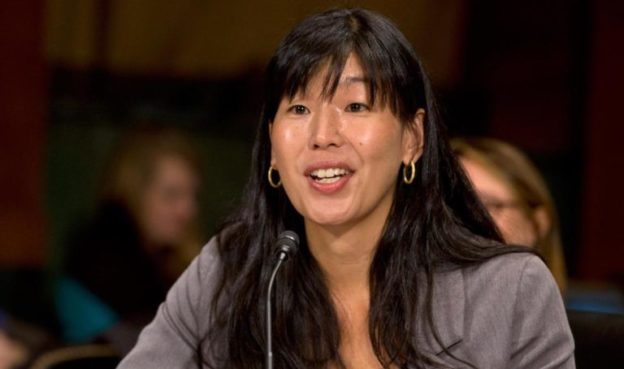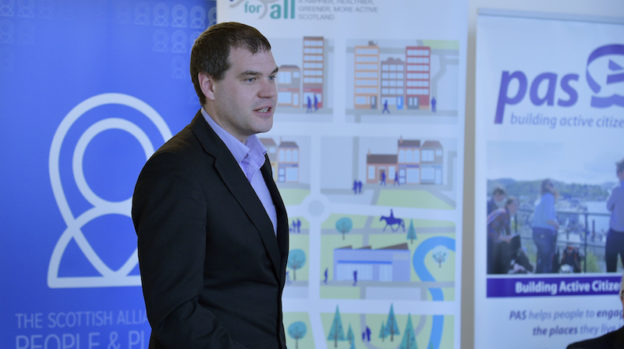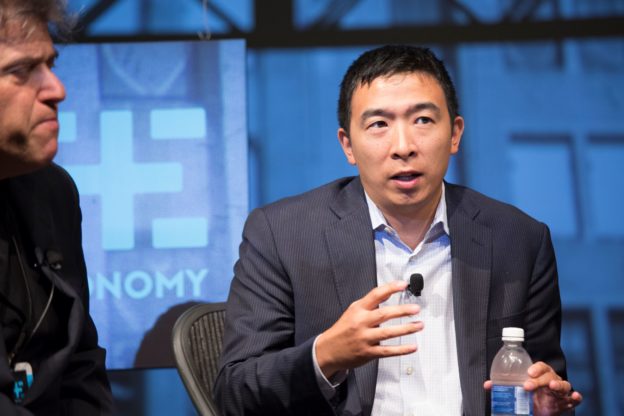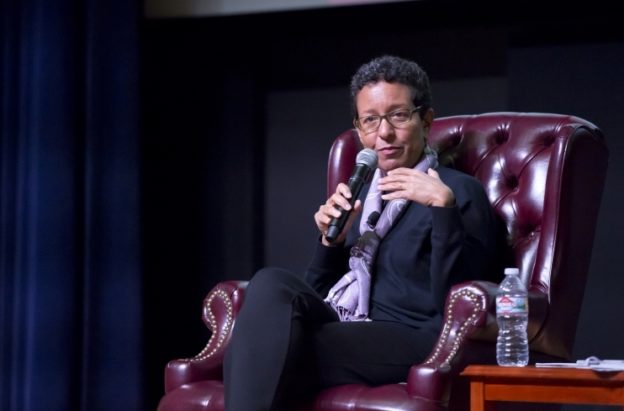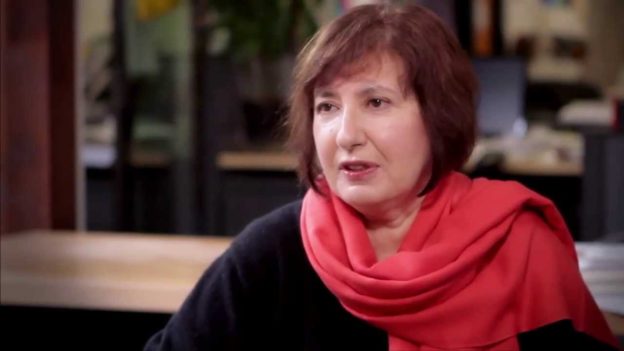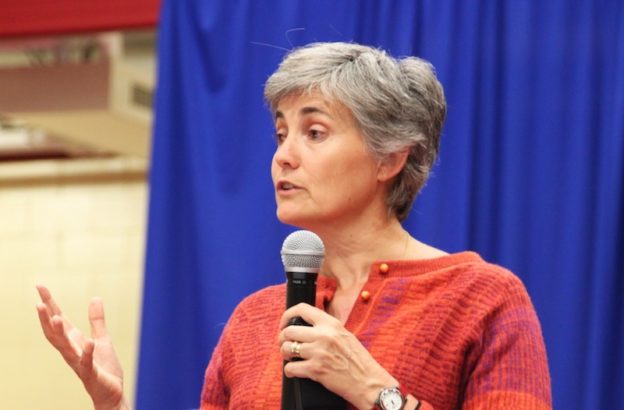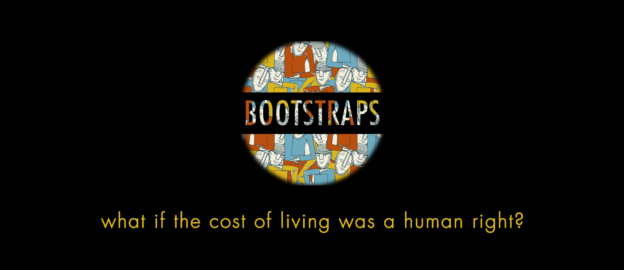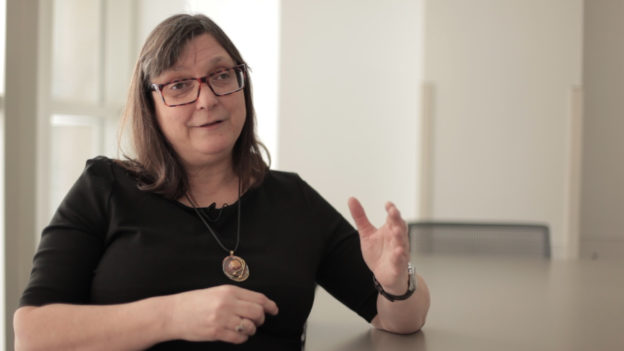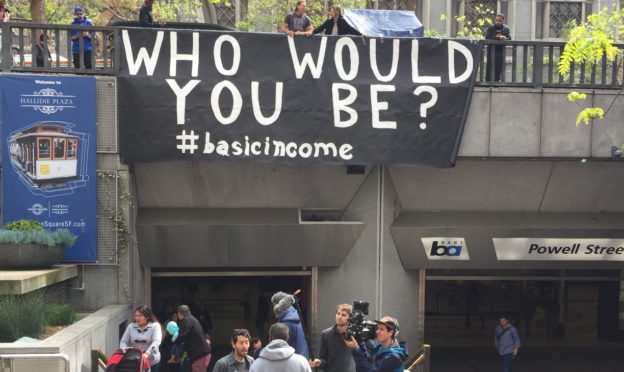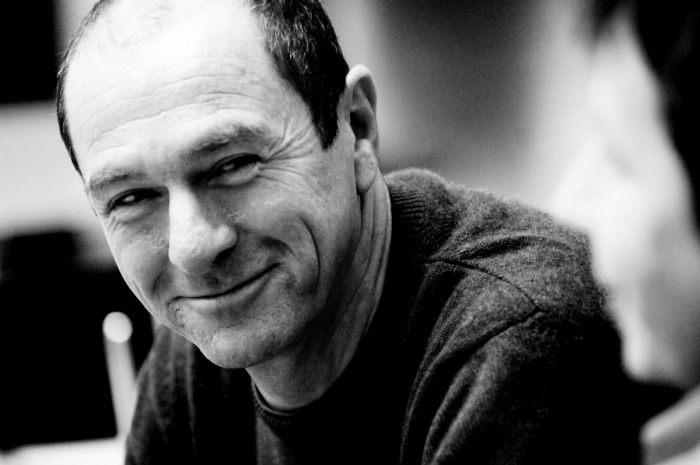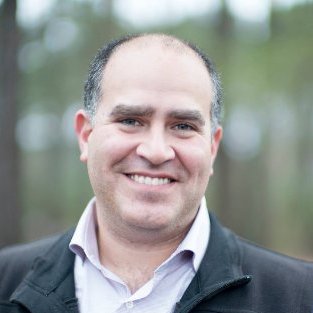
Annie Lowrey, Contributing Editor at the Atlantic, has caused a buzz with her new book “Give People Money: How a Universal Basic Income Would End Poverty, Revolutionize Work, and Remake the World.” In addition to the book itself, she has furthered the conversation with a recent New York Times op-ed and an appearance on The Daily Show with Trevor Noah. She joined the podcast to discuss her book and the reactions it’s received.
——
Episode Transcript
Owen: Hello, and welcome to the Basic Income Podcast. I’m Owen Poindexter.
Jim: And I’m Jim Pugh.
One big recent development in the basic income space was the release of a new book. Give People Money: How A Universal Basic Income Would End Poverty, Revolutionize Work, And Remake The World is a new book from Annie Lowrey. We’ve had Annie on the past talking about some of the journalistic work that she did around the GiveDirectly experiments in Kenya, but this book is making quite a splash. We thought it might make sense to talk to her again and hear a bit more about her experience with that, and what thinking went into it.
Owen: Here for the second time on the podcast is Annie Lowrey. She’s a Contributing Editor at The Atlantic and author of Give People Money. Welcome, Annie.
Annie: Thanks so much for having me back, guys.
Owen: Yes, I should mention you are, I think, our first repeat guest ever on the podcast, so that’s kind of cool too.
Annie: I am honored.
Owen: By writing this book, you are now very publicly identified with the basic income movement. What made you decide to throw your full weight behind basic income?
Annie: I think as you guys know and folks who read the book, although I feel like the listeners of your podcasts are so probably deep in the weeds on this that there’s not too much you can possibly tell them about it, but there had been a number of things that were written about basic income from an argued perspective. People who are really concerned about technological unemployment, really concerned about stronger anti-poverty measures, or looking at it from a green perspective, or even like a philosophical perspective.
The idea was to do a journalistic look on for folks who maybe have heard of it but didn’t know much about it, maybe had never heard of it. To write for a more generalized audience. As you guys know, and I’ve covered extensively, there’s just so much interest. I feel like it’s like every day or every week you hear about a new proposal, a new pilot, something going forward. It just feels like there’s just so much momentum behind it.
That’s a really fun thing. Very often economic policy is kind of a really slow burn. To see something rapidly developing in this way is really exciting and really fun to watch.
Jim: On a related note, talking about some of the past books that folks have written on basic income, often times the titles are more broad value statements, something like “Fair Shot” or “In Our Hands.” You went very direct: “Give People Money”. I’m curious, was that tied into thinking about who your audience was here? I’m curious what led to that decision.
Annie: Yes, I think that there in the United States is so much kind of– there’s almost like a philosophical objection to this idea that the government should ever just give people money despite the fact that through how many hundreds of programs in a lot of cases that is what it should do or is doing. Despite the evidence that in a lot of cases that is what it should be doing, as opposed to giving them in-kind benefits.
I feel like it just gets to the argument at the heart of the book, which is that, we have progressive government that redistributes income, but very often we have this really deep-rooted cultural and philosophical objection to just giving people cash, despite there being such fantastic evidence on how powerful a thing that can be.
It was somebody in my publisher who was like, “Oh, I like the title ‘Give People Money’. It’s just eye-catching.” Because we’d gone through a bunch of titles, but that was the one that they felt was gripping. Which was is I think the literal reason that it got picked.
Owen: Yes, so speaking of how people think about basic income, and there’s the philosophy behind it, you obviously know the political landscape around this really well, but I’m wondering if any of reactions of the book have surprised you.
Annie: Yes, I think I flipped in the book to anticipate a lot of knee jerk reactions that people have. It being too expensive is a pretty central one and one that I think that you can rebut pretty strongly in the US. People really get caught up on that, but I just wanted to get out in front of that one and some of the other ones, the usual suspects about work and about the idea of getting something for nothing, which I obviously think is problematic just in its construction.
A lot of the response, I’ve been really happy. One thing in writing in the book was I wanted it to be instead of sort of an argument, more like a jungle gym where people could come and think and explore and didn’t feel like they were in a position to be persuaded as or not, so much as they were there to kind of get their minds expanded. It’s been nice people seeing that and saying this is, in some sense, a book about basic income, but in other sense, it’s really not. It’s about all of the ideas that intersect with it, which is really what I had at least tried to do or would hope would be true for some readers.
Jim: I’m curious as you were painting that picture, were there parts in particular that stood out as being difficult to wrestle with? How did you untangle and explain some of the aspects of it that might be a conceptual lead for a lot of folks?
Annie: Yes. I think if you’re thinking about a UBI, you have to go back to the Kuznets first principles of what gets counted in an economy and what doesn’t. This goes back as far as economic research goes back, so you can probably go back to Adam Smith even. The whole issue of what you’re measuring and what you’re counting and how that relates to money as opposed to effort or labor. I think that that stuff is all super fascinating. What I think is interesting is, you have economists as a profession who say, “We understand that what you are measuring economically is not the same as value in the economy and what’s being produced and the importance of the roles that different people are playing.”
Nevertheless, you actually don’t have that much economic research that plays with the boundary of that, like looking at household production and looking at what’s counted and what isn’t. I think that that’s surprising. I wonder if there isn’t just a lot more interesting work to be done there. Maybe it’s a data limitation thing. That’s just one example of the big ideas that you can get caught up in there.
I think that there’s just a ton of really interesting political economy. Questions about who counts, who matters, who has political power. A lot of that is sort of– one of the issues that I think is really hard here is, do you create even more of an us and them dynamic if you have a stronger social safety net? There’s a lot of evidence of that, not just in the US, but from some of the Nordic countries and the way in which they might have become more anti-immigrant or even more nationalist in some cases.
All of that stuff I think is really interesting. UBI is an interesting frame for looking at it.
Owen: Yes, so there are a lot of rabbit holes, you can jump down when getting into UBI. I’m wondering, because this book is going to be a lot of people’s first comprehensive introduction to the topic, what do you think goes into a thoughtful, responsible introduction to basic income?
Annie: I feel like if you just say, “Look, this is an idea that has been around for a long time. Many brilliant people have adopted it as their own for their own reasons, with their own motivations.” That sort of looking at it as being a really fascinating but very malleable trend. I think it’s so fascinating that it’s one of these great ideas that on the one hand, it’s so simple and so singular, and on the other hand, it’s just so malleable. It has such a rich history. I feel like I’m at least pretty well up to date on a lot of the research, but even I keep on finding things that I had never found.
It’s kind of humbling in that way. As you were commenting on, there are just so many rabbit holes, and there are many people who put so much thought into it. I wanted to capture that and highlight a lot of other work and research and all the thinking that’s gone into it. I think it’s probably only been in the last 20, 30 years that you’ve really had a movement around it, too. That’s interesting as well, that you have people who are straightforwardly advocating it, sometimes for a really different reasons, but nevertheless are just trying to promote this idea around the world, which is a really fascinating trend as well.
Jim: This is generally been quite a big month for basic income. Beyond your book coming out, we also had President Obama talking about the need to pursue the policy in his Nelson Mandela lecture. Then Chicago, it came out is considering doing a pilot there.
On one hand, we have this movement here. On the other, looking at the federal government, we’re clearly a long ways away from seemingly being able to pass much of anything. I’m curious from your perspective, where do you feel like the movement is right now? Are we close in some ways? Are we far away? Do you have thoughts on where we go from here?
Annie: Close and far away is probably a good way to put it. I think it’s going to be really hard– I’m very interested to see how things like Stockton and Chicago and the Y Combinator experiment and others that were looking at how those — some of the guaranteed and minimum income ideas that are out there — how those play out.
But I think it’s going to be pretty hard to get convincing evidence on some of this stuff without the federal income tax lever. States have to balance their budget. They just don’t have the kind of capacity that the federal government has. Nevertheless, I would love it if you could get some kind of laboratory of democracy effect where you would have something smaller that could scale up that could really convince people it was a good idea.
Federally, or nationally, to put it in a different way, I do think that you could see a lot of movement towards considering a negative income tax, an EITC expansion, a conversion of TANF into a child grant or some kind of modification and expansion of the Child Tax Credit. That’s where I think that it’s more marginal policies that are really influenced by the idea of UBI and in some cases have a lot of the same proponents, that you could see movement.
There’s just such excitement on the left for these big blue sky ideas. It’s just a matter of time before there’s a shift in power and some of them get the pushed. There’s obviously just so much uncertainty, not just around the midterms, but who knows what’s going to happen in 2020? But it’s impossible to imagine that whoever is the Democratic candidate is not going to at the very least have something, something big along these lines, although I’d be very surprised if it was UBI itself.
Owen: Yes, it does feel like whether it’s jobs guarantee or at least an EITC expansion, that were at that point where everyone is going to have something like that in the platform, in the presidential race.
Annie: The thing that I’m actually hopeful for is folks have been pretty tentative about saying, “We need to do more for the lowest income Americans.” They don’t vote, they don’t have a ton of political power. You get into this whole thing is like why would you help somebody who won’t work to help themselves, which obviously is a very problematic sentiment, but nevertheless a common one.
I just have my fingers crossed that you’ll move to something like child grants or, again, the total reform of TANF, which would be a really good bang-for-the-buck-wise. I’m just not sure that anybody would run on it for political reasons.
Jim: Yes, I guess we’ll see. Politics seems like a crazy space these days, so I feel like “Never Say Never” anymore.
Annie: Yes, seriously.
Jim: You were on The Daily Show with Trevor Noah just recently talking about your book. Congrats on that.
Annie: Thank you.
Jim: During your conversation, one issue that came up was race and what impact that’s had on the history of our social safety net, but also around implications for it going forward. I’m curious if you want to say a little bit about your perspective on that front.
Annie: Yes, absolutely. If you are looking from the discipline of history or the discipline of sociology or the discipline of economics. It’s pretty clear that one of the main reasons — and I think it’s one of these things that it’s perhaps not a sufficient answer but it’s a necessary part of the answer — is that we don’t have the safety net that you would see in Canada or in other high income, similar high income OECD countries. It’s because of race and racism and how that played out in construction of the New Deal and Great Society programs.
I do think that racism explains a lot of the welfare chauvinism that you have in the United States, a lot of the judgment of lower income folks. Obviously, UBI pushes really hard in the other direction and basically says like, “No.” To the extent you’re means-testing anything, you just want this to be about poverty. You don’t want this to be a work effort or anything else if you’re thinking about a minimum income or even some kind of loose means testing, which is perhaps not a pure UBI, but that’s the idea.
I think that on the one hand, it would be good as a policy not to remedy the injustices of the past — obviously UBI wouldn’t touch wealth inequality, the racial wealth gap, which is a really pernicious problem — but would probably be more fair and less racist going forward. Like eliminating a lot of the requirements that you have in TANF and SNAP and converting to just a basic cash transfer program.
You have this really fascinating thing happening where the Republican Party is becoming older and whiter and more male and retaining power, out-sized power. You have a Democratic Party that is becoming younger, more diverse, in some cases more female, at least among white folks. I just think that it’s really uncertain how that is going to play out, but the polarization is kind of a frightening thing.
I think that you’re going to see entrenchment on both sides. I was just reading, Amy Chua’s book, which touches a lot on this. I think it’s going to be a really difficult thing, as the United States is going through in some ways a legitimately pretty sudden demographic change, how that’s going to affect what policies become popular among whom and what things raise the hackles and the tribalism of the other side.
Owen: Yes, that’s harrowing to think about sometimes. I’m wondering if you see any other major challenges. Obviously, there’s more than a few, but in terms of actually seeing basic income as a federal program or a robust state program, do you see any other major hurdles?
Annie: Yes, in some ways, I think that there’s probably opportunities that we’re not thinking about. Say some state got a waiver to take its TANF program and turn it into a cash grant for kids. Nothing is stopping that happening. My understanding is that the waivers for TANF are pretty– nobody’s talking about that, but that would be a pretty cool way to do things and maybe a way to kickstart the conversation.
Also, going forward, it’s going to be interesting to see how much especially, progressives and liberals feel hemmed in by government spending in the safety net. Whether they feel like they need to be the stewards of fiscal responsibility and cut spending while they’re also raising taxes. That’s a big question mark.
Certainly, I think it’s an exciting time in which the Overton Window has really been thrown open. I wouldn’t be surprised to just see exciting and more expansive policy-making in the future. I really hope that just getting a bigger sense of what’s possible and what the government and society by extension could be doing.
I think that the other thing is, imagine that in the next recession, there’s a recession, we’re recovering, and GDP is growing, and productivity is increasing, but the unemployment rate isn’t going down or even as going up. It’s the cocktail of those three things — so productivity increasing, GDP increasing, and unemployment increasing — that would be I think a pretty powerful trigger to say, “Oh, man. Technology is changing our economy in a way that’s really frightening. Let’s start thinking about how we want to help people through that.”
It’s just something to keep an eye on. Who knows if and when that might happen, but I think that that could really change the political conversation pretty quickly.
Owen: That was Annie Lowrey, Contributing Editor at The Atlantic and author of Give People Money: How a Universal Basic Income Would End Poverty, Revolutionized Work, and Remake The World.
Jim: I was really curious to hear from Annie as to what her motivations were around publishing a new book in this space. I thought her point about bringing a journalistic perspective to this made a ton of sense. As we talked about, if you look at the other books in the space, there’s a decent number out there at this point, but they do come at it from these different perspectives that inherently bring this lens. That affects how people perceive it. It affects who decides to read that. By taking this new approach, it opens up the potential that this might reach potentially a quite significant new audience.
Owen: Yes, I agree. It may reach a more, hopefully an academic crowd, but also a more popular audience just because she does have that cache as a well-known economic journalist. She gets into stuff that are a bit more weeds-y, like turning TANF into a cash grant. We should say TANF is the…
Jim: Temporary Assistance for Needy Families.
Owen: I was having trouble with the T. Temporary Assistance for Needy Families, or expanding the EITC, which of course is what Chris Hughes is calling for and maybe has a bit more momentum than UBI in terms of something that could happen sooner. It’s just good to get her perspective because it is very grounded in the data and the policy.
Jim: I thought it was also interesting and compelling to see how much of her perspective is informed by historical precedent. That she’s really thinking about what’s happened in the past, what has led us up to this moment, and what implications that has going forward.
I think often, particularly when people talk about UBI in the context of technology changing work, there is a tendency to just look at the system today and then extrapolate forward from there, as opposed to saying, “Well, let’s actually take the whole picture.” Let’s say, “How have things changed over past decades, and then given this moment, what do we think will actually happen going forward?”
Owen: We asked her about, her book is called Give People Money as opposed to some sort of value statement. But I feel like if you follow economics far enough, it is based on value statements. It was interesting to hear her unpack that a little bit in terms of the values, in terms of what we call work and what we call labor, and what’s compensated and what’s not. Obviously, that goes back at least a few hundred years, if not a few thousand.
Jim: It’s exciting to see how much traction this is getting so far and in the media pick up. Hopefully this just keeps momentum building.
Owen: Yes, more and more dominoes are following.
Alright, that’ll do it for this week on the Basic Income Podcast. Thank you to our producer Erick Davidson. Please subscribe and rate us on Apple Podcasts or the service of your choice. Tell your friends, we’re always looking for new listeners and more people in this conversation. We’ll see you next week.



